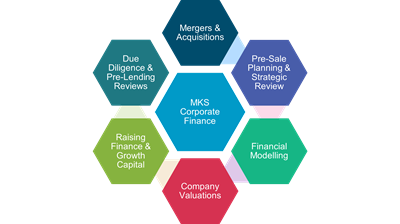Digital transformation is the strategic adoption of digital technologies to improve processes and productivity, deliver better customer and employee experiences, manage business risk and control costs. Coronavirus has greatly accelerated the adoption of digital technology, with the M&A landscape being no exception. Being able to react and respond to this digitalisation has become an increasingly attractive factor for investors looking to acquire businesses with digitalised core processes.
The impact of the pandemic
The pandemic has driven businesses to adjust rapidly in an increasingly digital world, both in terms of managing internal operations in a hybrid setting and connecting with customers. As restrictions forced many employees to work from home, organisations had to ensure business continuity, forcing technological shifts and cloud migration to maintain productivity.
At the same time, the pandemic expedited an already growing shift in customer demands, demanding improvements in digital connectivity to provide the best possible customer experience, with rapid acceleration in e-commerce. A McKinsey survey* showed that the average percentage of customer interactions that are digital increased from 36% in December 2019 to 58% in July 2020 worldwide, demonstrating how quickly the shift occurred, while in a 2021 survey, 55% of European companies stated the pandemic has increased the demand for digitalisation, and 46% of companies reported that they have grown more digital.
In an ever more competitive landscape where the barrier for disruptive new entrants to the market has lowered, traditional players must keep up with digital trends. M&A has been an attractive approach to kickstarting this transformation.
The latest Moore UK (OMB) survey carried out in April 2022 showed that 23% of UK business owners surveyed had implemented some form of digital transformation within their business in the past two years, with customer experience and cyber security being the most common areas for adopting digital solutions. These findings, although based on a survey of UK businesses, reflects global activity.
Figure 1: Excerpt from ‘ONWARDS AND UPWARDS: COULD DIGITAL TRANSFORMATION BE KEY TO RECOVERY? The Owner Managed Business view in April 2022’
 Acquisitions to accelerate digitalisation
Acquisitions to accelerate digitalisation
The survey also showed that 23% of UK business owners surveyed considered adapting and implementing new technology to be one of their biggest immediate challenges, citing cost savings and flexibility as the most significant benefits of digital transformation. 86% of businesses surveyed said rising costs will have an impact on future digital transformation. However, it is likely that digital and technological initiatives will be developed even faster than being put on hold. With new technologies delivering both cost and time savings, digital transformation will help to offset rising business costs, and could prove to be the solution businesses need to survive in the current climate of inflation and supply chain issues.
Figure 2: Excerpt from ‘ONWARDS AND UPWARDS: COULD DIGITAL TRANSFORMATION BE KEY TO RECOVERY? The Owner Managed Business view in April 2022’

Companies see acquisitions as a quicker and more effective way of reforming internal processes and reshaping their offering to customers. Acquiring digital capabilities can generate significant value by providing a more flexible, agile service to customers, while also reducing the risk of being left behind by competitors acquiring those capabilities.
M&A is increasingly seen as an opportunity to overhaul operations and refocus the business to keep pace with technological improvements. Private equity is looking to invest in companies that have adopted digital technologies. Equally, there is more M&A activity focusing on acquisitions of digital transformation consultancies, with Pitchbook showing 54 such deals in Europe in Q2 2022 compared to 28 in Q4 2019. This demonstrates the cross-sector demand for digitalisation, although it does not show the number of acquisitions to directly drive digital transformation within a business through M&A.
The principal rationale for corporate acquisitions remains earnings accretion. Buyers are also looking at jumpstarting their own processes of digital transformation by bringing in this expertise when they buy. Businesses who have moved ahead of the competition on their digital transformation journey are more attractive to buyers.
Digital transformation and the race for talent
Many companies are struggling to hire and retain employees in the current climate. An M&A-driven strategy towards digital transformation may offer additional opportunity. An ‘acquihiring’ strategy of acquisitions undertaken largely for the employees may be seen as a key approach to overcoming the considerable challenges in building and sustaining talent capable of driving digitalisation of a more traditional business. By bringing in highly skilled, digitally native teams through acquiring a company can sidestep the challenge of attracting the right people to organically transform the business to meet the demands of the digital world.
Conclusion
While there was a significant trend towards digital transformation previously, the pandemic greatly accelerated the need for businesses to digitalise in order to survive, having to adapt to remote working, increased security risks and more digital interactions with customers. Businesses that are ahead of the competition in adopting digital technologies may see substantial advantages as they are better set up to face the challenges of supply chain issues, inflation and the challenging employment market. Acquisitions are a way for businesses to jumpstart their digital transformation and digital strengths are increasingly attractive both to trade buyers and private equity.
ABOUT MOORE KINGSTON SMITH CORPORATE FINANCE
We are a team of 21 dedicated corporate finance professionals with extensive lead advisory and transaction services experience.

The team completed 57 transactions in 2021 across a range of sectors including media, marketing services, consulting, IT managed services, technology, education, manufacturing and retail. Overall the team has completed over 500 transactions both locally and internationally.
Check out our most recent work here:
Moore Kingston SmithRecent projects – Moore Kingston Smith (mooreks.co.uk)
FOR REFERENCE:
*
COVID-19 digital transformation & technology | McKinsey
Moore-UK-OMB-Survey-Report-Spring-22.pdf